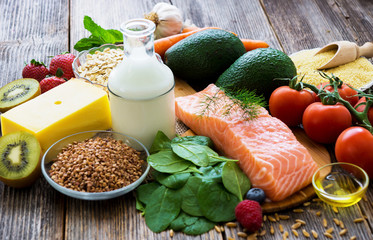Seniors and Diet-9 Essential Vitamins and Minerals
I have written several articles for seniors on the benefits of exercise, even recommending a few, but going hand in hand with that is a healthy diet that provides the essential nutrients our bodies need. These become even more important as we age. Rather than bore you with research proving this, let’s jump ahead and look at some of the more essential vitamins and minerals deemed important for maintaining good health.
- Calcium – The Mayo Clinic has long held that calcium is essential not only for building and maintaining bone strength but also for the proper functioning of the heart, muscles and nerves. Foods high in calcium include dairy products, dark green leafy vegetables, fish with edible soft bones, and calcium-fortified foods and beverages.
- Vitamin D – Known as the “sunshine vitamin”, Anna Medaris Miller, a Senior Health Editor at U.S. News, recently reported on Vitamin D and its benefits. First, it is necessary for the absorption of calcium and is essential for bone health, bodily functions and staving off infection. Foods high in vitamin D include egg yolk, salmon, canned tuna, oysters, shrimp, mushrooms, and oatmeal.
- Magnesium – Megan Ware, a registered dietitian and personal nutrition consultant, wrote in Medical News Today that “magnesium plays a role in over 300 enzymatic reactions within the body, including the metabolism of food, synthesis of fatty acids and proteins, and the transmission of nerve impulses”. It also helps with bone and heart health, as well as fighting diabetes and anxiety. Magnesium is contained in a variety of sources including spinach, bananas, avocado, brown rice, quinoa, brazil nuts, and legumes.
- Fiber – Elizabeth Bemis, Vice President of Marketing, Promotions, and Assisted Living Operations for United Methodist Homes, synthesized the research, finding that fiber is known to “help fight heart disease by lowering cholesterol levels” as well as “help control blood glucose levels” in the fight against diabetes. Foods high in fiber include whole grains, fruits and vegetables, beans and peas, as well as nuts and seeds.
- Vitamin C – Marisa Moore, a nutritionist and dietitian, outlines in Eat Right, the benefits of vitamin c. It is known to “help heal wounds and repair and maintain healthy bones, teeth, skin and cartilage” plus “fight free radicals in the body which may help prevent or delay certain cancers and heart disease, and promote healthy aging.” Cantaloupe, citrus fruits, kiwi fruit, papaya, pineapple, mango, and assorted berries are all high in vitamin C.
- Potassium – Erica Wickham, a registered dietitian, states in Healthy Eating, that” It is a necessary component in all cells, tissues, and organs. Potassium is also required for metabolism and normal heart, muscle, and nerve function.” Foods with high levels of potassium include “broccoli, peas, tomatoes, potatoes, winter squash, apricots, citrus fruits, kiwi, bananas and melons.”
- Vitamin B12 –Peter Jaret a freelance writer, penned on Web MD that vitamin B12 is essential for “creating red blood cells” and “maintaining healthy nerve function.” The best sources of B12 include “fish, meat, poultry, eggs, milk, and milk products.”
- Vitamin B6 – The Mayo Clinic writes that B6 “is important for normal brain development and for keeping the nervous system and immune system healthy.” Foods high in vitamin B6 “include poultry, fish, potatoes, chickpeas, and bananas.”
- Fats – The Cleveland Clinic, writes that fats are essential for, among other things, being a source of energy and insulating our bodies to protect organs. The healthiest fats are those that are polyunsaturated and monounsaturated (that’s a mouthful). It is not within the scope of this article to embark on a lengthy discussion on the differences in all fats. Thousands can be found on the internet. Essentially, these two are the healthiest ones, differing in how they bond chemically. The best-known polyunsaturated fats are from the Omega 3 family, known for their benefits to the heart, and can be found in salmon, tuna, herring and anchovies. Monounsaturated fat is plant-based and can be found in corn, soybeans, nuts, olives, and avocados.
Good health is essential to an independent lifestyle. Knowing what nutrients certain foods contain is important in making smart choices. I still like pizza, but I don’t eat it seven times a week. I’m at an age where I need to make better, healthier choices. The research I found also supports that taking more than the recommended dosage could result in any of several problems. If you are starting a new diet and have questions don’t hesitate to research what foods are the best for you. If you have not dieted in quite some time, it probably would not hurt to consult your physician or licensed nutrition professional.


Recent Comments